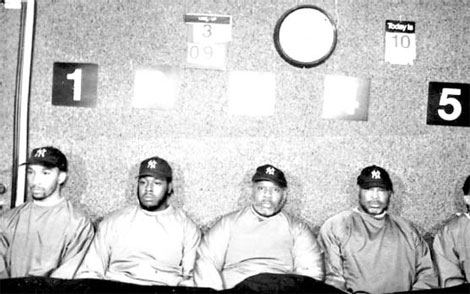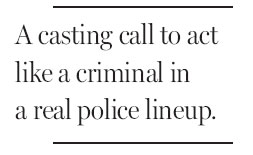Specialist fills up the lineup
 |
|
"Fillers" who take part in lineups of suspects in the Bronx get paid $10. Office of the Bronx District Attorney |
He is one of New York's busiest casting directors, yet very few know of his work.
"Light-skinned Hispanic?"
Robert Weston mulled over the possibilities. He knew they would want five people; they always do.
"Javier, Javier Jr., Eddie, Ray," he said into a cellphone, "and I'll get another Spanish guy."
Mr. Weston, 45, was not casting for an Off Broadway production.
For some 15 years, Mr. Weston has been providing the New York Police Department with "fillers" - the five decoys who accompany the suspect in police identification lineups. Detectives often pay Mr. Weston $10 to find fillers for them.
A short man with a pencil-thin beard, given to profanity and coconut-flavored liquor, Mr. Weston points out that he has never failed to produce lineups when asked, no matter what time of night.
"I never say no to money," he said.
Across the United States, police lineups are under a fresh round of legal scrutiny. Studies have suggested that mistaken identifications in lineups are a leading cause of wrongful convictions, and that witnesses can be steered toward selecting the suspect arrested by the police.
But for all the attention that lineups attract in legal circles, Mr. Weston's role in finding lineup fillers is largely unknown. Few defense lawyers and prosecutors, though they spar over the admissibility of lineups in court, have heard of him.
Mr. Weston says he is always on call; his Bluetooth earpiece comes off in public only when he goes to the barber for his weekly $16 trim.

His cellphone, he says, holds the numbers of some 100 potential lineup fillers, mostly friends and acquaintances from the public housing project in the South Bronx where he has lived most of his life.
He complains about how people hound him for the chance to make a few dollars through lineup work. "I can't even play basketball on the courts or sit here and drink a beer," Mr. Weston said on a recent afternoon. "People are always asking me if there is a lineup."
Fillers are paid $10 for a lineup in the Bronx. For each lineup that Mr. Weston fills, he receives $10; he gets more if he sits in as a filler or if his services are required in another borough.
This is Mr. Weston's primary source of income. Some days he organizes as many as four lineups; on other days, none at all.
"There's not enough crime now," he said. "But it comes and goes, and there're always going to be knuckleheads stealing phones."
Mr. Weston said he got his start compiling lineups about 15 years ago, when he was interrupted while eating lunch outside in the Bronx. A police officer asked if he would participate in a lineup and if he could find friends, too.
His reputation as someone who could fill a lineup grew, and detectives began to pass around first his beeper number, and later his cellphone number, which is now posted in some squad rooms. The reason detectives prefer him is simple.
"He always picks up his phone," said one veteran Bronx detective.
But detectives are not always satisfied. "Every time I call him and I tell him I need light-skin Hispanic of that description, he always brings dark-skin," a Bronx homicide detective, Luke Waters, testified earlier this year, according to a court transcript. "He wants to make money as quick as he can, and when he brings them in I don't like them."
Mr. Weston said he had appeared in countless lineups over the years.
His lineup fillers fall into four categories: black men, black women, Hispanic men and Hispanic women. He said he had no candidates to match a white suspect of either sex. "They call me for that, and I don't have that," he said. "They go to the homeless shelter for white guys."
Mr. Weston is aware that his job is precarious, and that detectives could decide to find someone else to provide fillers. To reduce the chances of that, he said, he tries to avoid serious trouble. (A recent arrest for drinking a beer in public does not fall in that category, he said.)
He almost lost his role once, when a detective's cellphone was discovered to be missing shortly after a group of Mr. Weston's fillers left a stationhouse, the detective said. Detectives in the Bronx told Mr. Weston that until the phone was returned, he would not be getting calls for fillers.
After a few weeks, Mr. Weston was able to track down the phone and return it, the detective said.
Mr. Weston said he was sensitive to how he appeared in the neighborhood, given his relationship with the police.
On this point, Mr. Weston wanted to be clear: All he does is provide fillers, no questions asked.
"I don't care what you're done," he said.


















